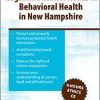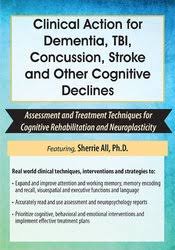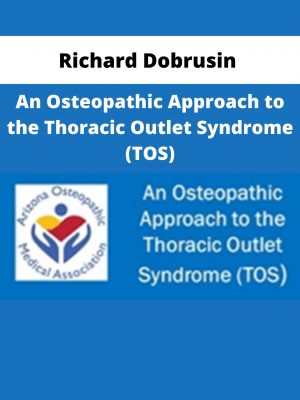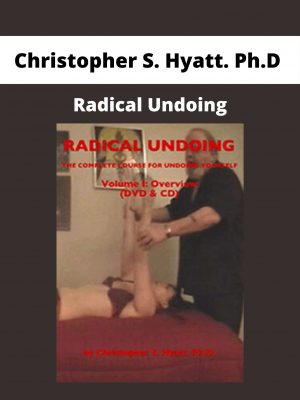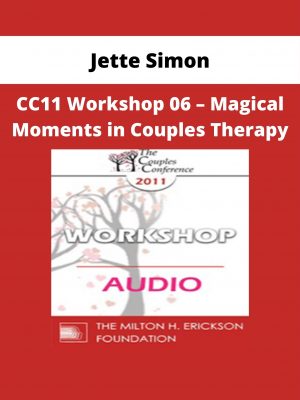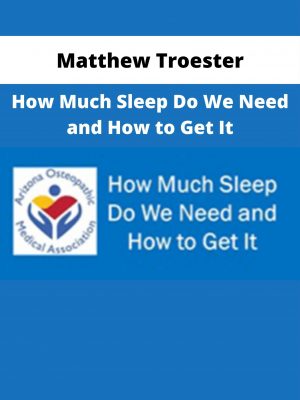Sherrie All – Clinical Action for Dementia
$219 Original price was: $219.$62Current price is: $62.
Shopping Instructions:
- DISCOUNT 15% : SHOP15
- Product Delivery: Within 1 – 12 hours after purchase.
The treatment landscape for dementia and brain related cognitive interventions is rapidly changing, making it difficult to stay abreast of treatments that work and those that have been over-hyped.
Sherrie All – Clinical Action for Dementia
THE FRAMEWORK AND SCIENCE OF COGNITIVE REHABILITATION: NOT ALL BRAIN GAMES ARE REHABILITATION
- Brain plasticity and the latest research
- Associated brain regions and functions
- Compensatory vs. restorative strategies
- Cognitive stimulation, cognitive training and cognitive rehabilitation
ASSESSMENT APPROACHES FOR COGNITIVE DECLINE
- What the MOCA and SLUMS are telling you and not telling you
- When to refer for a full neuropsychological assessment
- Make the most of assessment results including neuropsychology reports
- Static (TBI / stroke) vs. progressive decline (Alzheimer’s disease): Set and maintain realistic treatment goals
- Taking care to not “over-pathologize” concussions: Know the difference between concussion, TBI, CTE and dementia
- The use of mood and personality measures
INTERVENTION APPROACHES FOR BARRIERS TO REHABILITATION: MOOD, MOTIVATION & ANXIETY
- Motivational interviewing to cultivate engagement and brain health interventions
- Treat anxiety and false beliefs to improve cognition
- Adjustment to illness and grief: Counseling the brain impaired patient
THE COGNITIVE DECLINE TOOLBOX: REAL WORLD TREATMENT STRATEGIES FOR EACH COGNITIVE DOMAIN
ATTENTION & WORKING MEMORY
- The neural bases of attention impairment
- Help clients understand working memory capacity as a means of improving metacognition
- Improve attention and reduce errors by following the DIRECT model and using PEAS & LEAP
- “Focused drilling” to expand working memory capacity and generalizing to other outcomes
- Mindfulness training to help clients shape attention and improve focus
MEMORY: PROSPECTIVE, ENCODING & RECALL
- The neural bases of memory impairment
- Frontiers in Alzheimer’s disease management
- Tailor memory training interventions to level of severity & motivation
- Effective use of calendars and other external memory aids for effective daily functioning
- Elaborative encoding techniques using visualization, linking and chunking
- Memory aids in traditional psychotherapy treatments
- Strategies for effective recall of learned information
EXECUTIVE FUNCTION
- The neural bases of executive function impairment
- Stroke and cerebrovascular disease
- Improve planning for greater goal attainment with the use of a reverse timeline worksheet
- Expand flexible thinking with 6-step problem solving
- The neural basis of stress management and emotion regulation
VISUOSPATIAL & LANGUAGE
- The neural bases of visual and language impairment
- Useful Field of View Training (UFOV) for driving independence
- The “language wallet” for independence among people with aphasia
- Supported conversation and script training for aphasia
HOLISTIC BRAIN HEALTH INTERVENTIONS
- Shape the brain’s destiny: Cognitive reserve to build resistance and resilience to cognitive decline
- The impact of socialization on brain health and recovery
- Psychotherapy’s impact on brain health
- Effective cognitive stimulation: The truth about brain games & crosswords
- Teach clients how their brain works through metacognition intervention
RESEARCH, LIMITATIONS AND RISKS
Would you like to receive Sherrie All – Clinical Action for Dementia ?
Description:
The treatment landscape for dementia and brain related cognitive interventions is rapidly changing, making it difficult to stay abreast of treatments that work and those that have been over-hyped. With the popular understanding of brain plasticity increasing while concussion-related conditions are gaining a wealth of media focus, patients are looking to you to help them separate fact from fiction about brain health and rehabilitation.
Using the latest science, Dr. All will teach you practical interventions to best help your clients build and maintain cognitive skills and functional independence. You will leave this recording with a comprehensive toolbox of evidence-based cognitive rehabilitation interventions and the skills you need to match them to the cognitive domains for which they are most effective.
Drawing on over 15 years of clinical experience, Dr. All will teach you techniques and interventions to effectively:
- Assess for cognitive decline and accurately interpret complicated assessment reports
- Determine when to refer out to a specialist for more detailed assessment
- Put the recommendations of a neuropsychological report into action
- Create actionable treatment plans to immediately start helping your clients
- Expand working memory and enhance attention, generalizing to real-world functioning
- Improve memory encoding, consolidation, and retrieval to improve client independence
- Expand executive functions including planning and problem solving to promote flexible thinking
- Improve visuospatial function and language to enhance client independence and social functioning
Walk away with practical and useful techniques that can be implemented immediately within your practice. Start feeling confident in delivering the rehabilitation interventions your clients facing cognitive decline so desperately need!
Related products
HEALTH & MEDICAL
HEALTH & MEDICAL
Bernadette Giorgi – Attitude Ballet & Pilates Fusion – Just B Method
HEALTH & MEDICAL
CC11 Workshop 06 – Magical Moments in Couples Therapy – Jette Simon
HEALTH & MEDICAL
HEALTH & MEDICAL
Matthew Troester – How Much Sleep Do We Need and How to Get It
HEALTH & MEDICAL

